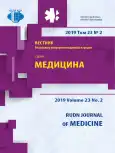ENDOMETRITIS ULTRASOUND DIAGNOSIS: FEATURES OF BLOOD SUPPLY OF DIFFERENT MORPHOLOGICAL TYPES
- 作者: Ozerskaya I.A.1, Kazaryan G.G.2
-
隶属关系:
- Peoples’ Friendship University of Russia (RUDN University)
- LLC Scientific and Practical Center for Minimally Invasive Surgery and Gynecology
- 期: 卷 23, 编号 2 (2019)
- 页面: 147-155
- 栏目: OBSTETRICS AND GYNECOLOGY
- URL: https://journal-vniispk.ru/2313-0245/article/view/345273
- DOI: https://doi.org/10.22363/2313-0245-2019-23-2-147-155
- ID: 345273
如何引用文章
全文:
详细
Aim. Despite significant advances in modern gynecology, endometritis is often unrecognized, being the main reason leading to persistent infertility or repeated pregnancy loss. There are 3 morphological types of chronic endometritis: hyperplastic, hypoplastic and mixed. The aim of the study was to develop ultrasound signs and hemodynamic features of various morphological types of chronic endometritis. Matherials and Methods. A retrospective analysis of 162 patients of reproductive age (22-50 years old) diagnosed with endometritis was carried out. The comparison group consisted of 96 women 17-42 years old without gynecological pathology (P > 0.05). The study was conducted in the proliferative phase of the cycle up to 10 days. The hemodynamics of the uterus and endometrium was evaluated on the basis of Doppler blood flow parameters in the uterine arteries, the calculation of arterial perfusion index (API), vascularization index (VI) and flow index (FI) of the uterus and endometrium obtained by 3D Doppler. Results. Depending on the morphotype of endometritis, hemodynamic features were evaluated. It was revealed that in the hypoplastic type, to which patients are related with the ratio of the endometrial volume to the volume of the uterus less than 2.5%, there is a significant (P < 0.05) decrease API, as well as hypovascularization of the uterus. Hypervascularization of the uterus and endometrium was observed both with a mixed morphotype, when the ratio of the endometrial volume to the volume of the uterus was from 2.5 to 9.0%, and in the case of a hyperplastic morphotype, when the volume of the endometrium to the volume of the uterus exceeded 9.0%. AIP was no different from healthy women. Conclusions. Diagnosis of impaired blood supply to the uterus will allow reasonable treatment and restore the reproductive function of women.
关键词
作者简介
I. Ozerskaya
Peoples’ Friendship University of Russia (RUDN University)
编辑信件的主要联系方式.
Email: ozerskaya_usd@mail.ru
Moscow, Russia
G. Kazaryan
LLC Scientific and Practical Center for Minimally Invasive Surgery and Gynecology
Email: ozerskaya_usd@mail.ru
Moscow, Russia
参考
- Petrov Yu.A. Chronicheskiy endometrit v reproductivnom vozraste: etiologiya, patogenez, diagnostika, lechenie i profilaktika. [Dissertation]. Moscow. 2012. 268 p. (In Russ).
- Dolgushina V.F., Nadvikova T.V., Troshina N.A., Letyagina N.P. Clinical characteristics of chronic endometritis. Uralsky meditsinsky zhurnal. 2014. V. 1. № 115. P. 56-9. (In Russ).
- Shanin V.Yu. Inflammation. Clinical pathophysiology. Shevchenko Yu.L., editor. Saint Petersburg: Special Literature; 1998. P. 170-97. (In Russ).
- Kitaya K., Yasuo T. Immunohistochemistrical and clinicopathological characterization of chronic endometritis. Am. J. Reprod. Immunol. 2011. V. 66. № 5. 410-15. doi.org/10.1111/j.1600-0897.2011.01051.x.
- Petrov Yu.A. Efficiency of sonographic diagnosis of chronic endometritis. Vestnik RUDN, ser. Meditsina. 2011. No. 5. P. 248-52. (In Russ).
- Ozerskaya I.A., Semiletova A.A., Kazaryan G.G. Ultrasound diagnosis of endometritis (B-mode). Ultrasonic & functional diagnostics. 2017. V. 6. P. 36-52. (In Russ).
- Munro M.G., Critchley H.O., Broder M.S., Fraser I.S. FIGO Working Group on Menstrual Disorders. FIGO classification system (PALM-COEIN) for causes of abnormal uterine bleeding in nongravid women of reproductive age. Int J Gynaecol Obstet. 2011. V. 113. № 1. P. 3-13. doi: 10.1016/j.ijgo.2010.11.011.
- Tapilskaya N.I., Karpeev S.A., Kuznetsova I.V. Chronic endometritis - subclinical inflammatory disease of the pelvic organs. Gynecology. 2014. V. 1. P. 104-9. (In Russ). doi: 10.26442/2079-5831_16.1.100-105.
- Kolmyk V.A., Nasyrov R.A., Kutusheva G.F. Clinical and immunohistochemical aspects of the restoration of the reproductive function of women with chronic endometritis. Journal of Obstetrics and Women's Diseases. 2014. V. 63. № 4. P. 34-8. (In Russ). doi.org/ 10.17816/JOWD63434-38.
- Bouet P.E., El Hachem H., Monceau E., Gariépy G., Kadoch I.J., Sylvestre C. Chronic endometritis in women with recurrent pregnancy loss and recurrent implantation failure: prevalence and role of office hysteroscopy and immunohistochemistry in diagnosis. Fertil. Steril. 2016. V. 105. № 1. P. 106-10. doi: 10.1016/j.fertnstert. 2015.09.025.
- Arutyunyan N.A., Zuev V.M., Ishchenko A.I., Bryunin D.V., Khokhlova I.D., Dzhibladze T.A. Evaluating the effectiveness of immunohistochemical methods in diagnosing the state of the endometrium in women with uterine form of infertility. Clinical Medicine. 2017. V. 9. № 1. P. 103-8. (In Russ). doi.org/10.17691/ stm2017.9.1.13.
- Titchenko Yu.P., Zarochentseva N.V., Arshakyan A.K., Menshikova N.S. The use of ultrasound research methods in assessing the state of the endometrium in patients with chronic endometritis and miscarriage. Rossiyskiy vestnik akushera-ginekologa. 2014. V. 1. P. 55-60. (In Russ). doi.org/10.17116/rosakush201717529-34.
- Maltseva L.I., Smolina G.R., Yupatov E.Yu. Chronic endometritis and pelvic pain. Akusherstvo Ginekologiya Reproduktsiya. 2012. V. 6. № 3. P. 23-7. (In Russ).
- Kolpinsky G.I., Kamaeva T.A. The role of ultrasound of the pelvic organs in endometrial pathology in preparation for IVF procedure. Uspekhi sovremennoy nauki. 2016. V. 5. № 12. P. 134-9. (In Russ).
- Serova O.F., Sedaya L.V., Shutikova N.V., Sovaev N.I., Eliseev E.N. Morphofunctional state of the thin endometrium and the possibility of its correction. Akusherstvo Ginekologiya Reproduktsiya. 2012. V. 6. № 3. P. 23-7. (In Russ).
补充文件









